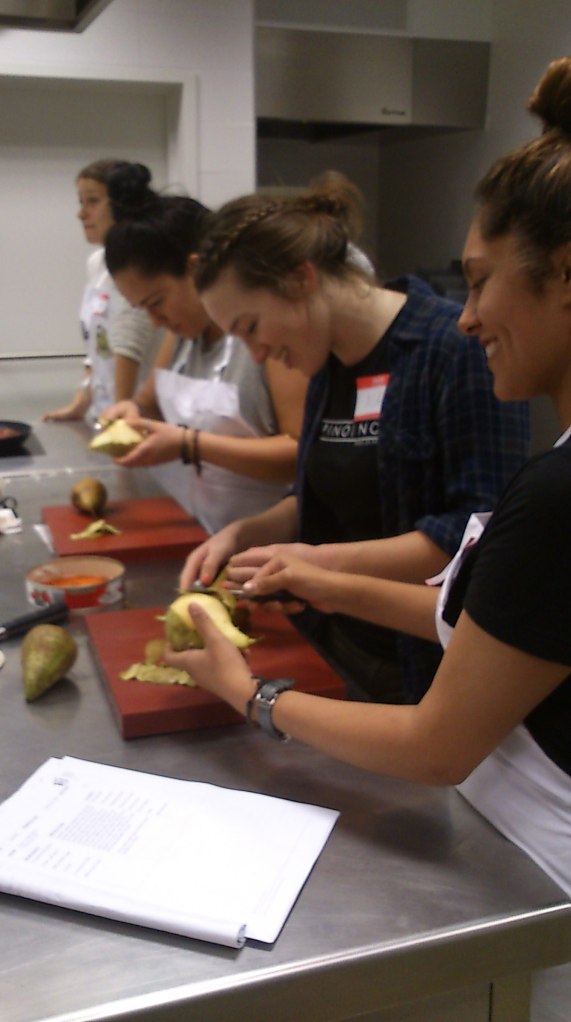A productive night it was in our cozy kitchen in the BCulinary Club at the Basque Culinary Center. Our dishes — Riojan-style Potatoes with Chorizo and Pork Ribs, Salt Cod in Pil Pil Sauce with Piquillo Peppers, and Pears in Wine — were a comforting antidote to the day’s orange-alert level winds and rains.
One of the night’s highlights was an impromptu performance of a sweet ditty about cephalopods. (Hopefully next week, when we prepare our Galician-style Octopus with Potatoes, we’ll catch a repeat performance on video!)
Speaking of cephalopods, who knew that the world just celebrated International Cephalopod Awareness Days? In a future post, Brittany will offer some insights about the biology and behaviour of these tremendous (and usually delicious) creatures, the most intelligent invertebrates on the planet!
And speaking of tremendous ocean creatures, soon we’ll also have a closer look at cod and cod fishing practices in the Basque Country and in other parts of the world, including some perspective from Zac, who fishes commercially with his brother out of (my home state of) Massachusetts!
In class this week, we had a chance to get better acquainted with two very special varieties of peppers ubiquitous in Basque cuisine – dried pimientos choriceros (central flavor elements of our Sukalki and last night’s Riojan-style Potatoes recipes)…

Choricero peppers drying in Vizcaya. Photo by Garikoitz Estornés Zubizarreta, 2000, Euskomedia.org.
…and roasted pimientos del piquillo (that we poached in olive oil with garlic to make the garnish for our Salt Cod in Pil Pil Sauce).
Piquillo peppers are primarily grown in the Basque province of Navarra, where they have their own Designation of Origen (D.O.) as Piquillos de Lodosa. The are traditionally fire-roasted and peeled by hand. Here you can have a closer look at the process.

Piquillos roasting. Souce: https://www.facebook.com/photo.php?fbid=330643093746802&set=pb.142942665850180.-2207520000.1383821147.&type=3&theater
We compared the prepared, bottled flesh (“carne“) of rehydrated choricero peppers (tasty)…  …to the carne we removed ourselves from whole, rehydrated peppers (very tasty!).
…to the carne we removed ourselves from whole, rehydrated peppers (very tasty!).
We made a hefty sofrito to get our potatoes started on the right path…
…and we took advantage of our heavenly pork rib broth to round out the dish. (A few of us even slurped down the vegetables leftover from the broth! Not naming names….)
We honed our paring skills, peeling pears for our dessert…
…and finally, as our night drew to a close and our appetites escalated, we prepared our Salt Cod in Pil Pil Sauce — a storied Basque dish whose preparation highlights one of my favourite insights about good cooking:
To cook well, one must not only be capable of a series of basic techniques (please check out Amanda Gold‘s great article, 10 Techniques Every Cook Should Know), but one must develop a deep understanding of what Harold McGee calls the invisible ingredient in every kitchen: HEAT. And, I would add, of the particular relationship between HEAT and TIME that applies to any given preparation.
(This is a topic I hope to explore in a future post. Memories of line cooking and kitchen multi-tasking, the little voices in my head [familiar to anyone who’s ever cooked professionally!] constantly chattering: “How hot is that?” “How long has that been in/on there?” “That’s too hot!” “That needs to come up to temperature!” “The pan must be smoking hot!”)
So what about our salt cod? All this to say, our cod was delicious, and our sauce was full of cod-garlic-cayene-olive oil flavor…  …but we did NOT successfully work the magic of creating a true Pil Pil sauce (a creamy emulsion derived from the protein-rich juice, or gelatin, that the cod exudes as it slowly poaches in warm oil), because the process, of course, is NOT magic, it’s SCIENCE, and, quite simply, the oil was too warm to properly emulsify our protein! Cook and learn. Learn and cook. We’ll try again, though. Elkarrekin. Cooking and learning together. And next time we won’t wait until we’re so hungry! Until then, On Egin!
…but we did NOT successfully work the magic of creating a true Pil Pil sauce (a creamy emulsion derived from the protein-rich juice, or gelatin, that the cod exudes as it slowly poaches in warm oil), because the process, of course, is NOT magic, it’s SCIENCE, and, quite simply, the oil was too warm to properly emulsify our protein! Cook and learn. Learn and cook. We’ll try again, though. Elkarrekin. Cooking and learning together. And next time we won’t wait until we’re so hungry! Until then, On Egin!







Pingback: An Aromatic Journey Leading to our Recipe for New England-Meets-Basque-Style Clam and Salt Cod Chowder | Cooking Elkarrekin